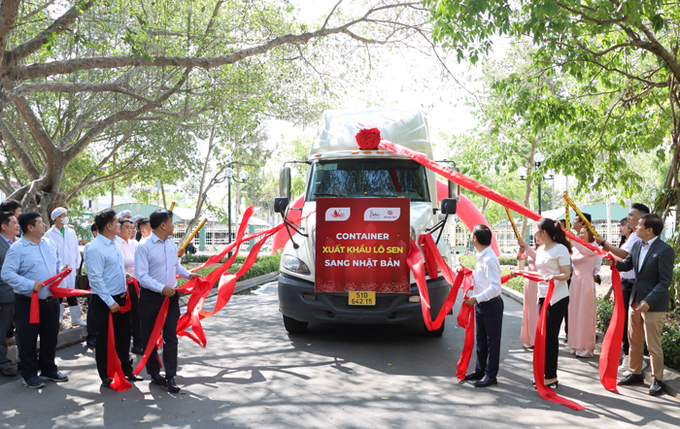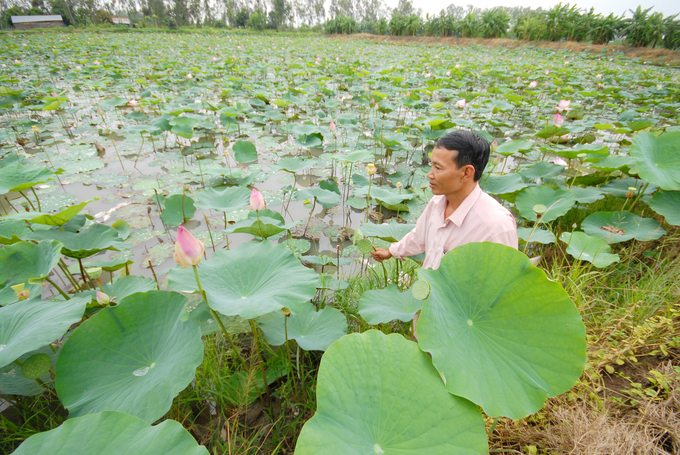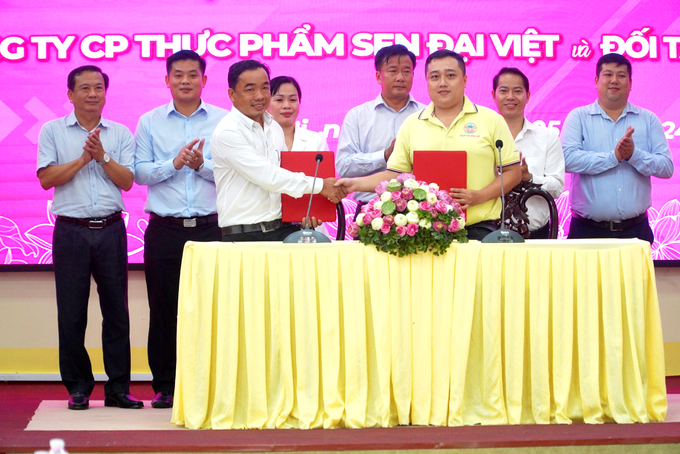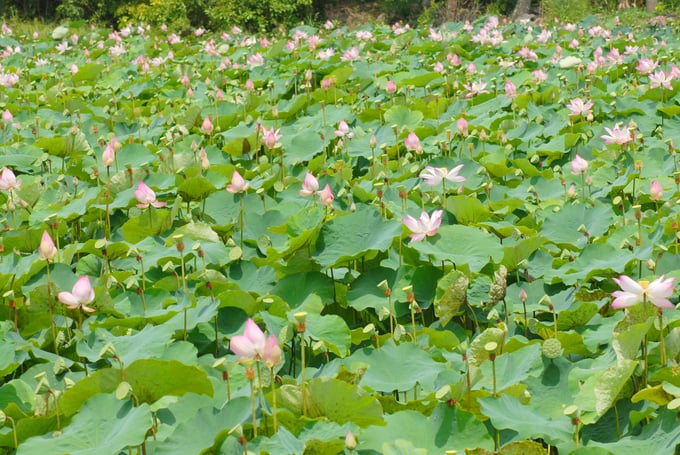May 17, 2025 | 11:22 GMT +7
May 17, 2025 | 11:22 GMT +7
Hotline: 0913.378.918
May 17, 2025 | 11:22 GMT +7
Hotline: 0913.378.918

Representatives from the Dong Thap Provincial People's Committees, Thap Muoi District People's Committees, Dong Thap Lotus Industry Association, and Dai Viet Lotus Foods Joint Stock Company performing the ceremony to commemorate the first container of exported lotus root to Japan. Photo: Le Hoang Vu.
Dai Viet Lotus Foods Joint Stock Company, in collaboration with the Dong Thap Lotus Industry Association, held a ceremony on May 7, in Thap Muoi district, Dong Thap province to announce the first 15-ton export shipment of lotus root to Japan. After extensive negotiations, fresh Vietnamese lotus roots have gained official access to the Japanese market. This export shipment represents a significant milestone for the development of the Dong Thap lotus industry.
The ceremony was one of several activities celebrating the second Dong Thap Lotus Festival, which is scheduled to take place from May 16 to May 19, at Van Mieu Park, Ly Thuong Kiet Street, Ward 1, Cao Lanh city, Dong Thap province.
In July 2023, the Agricultural Service Center of Thap Muoi district - Dong Thap province, coordinated with Dai Viet Lotus Foods Joint Stock Company, a company specializing in lotus-based products with a factory located in Thap Muoi district, to implement a pilot lotus root production model. The model, spanning 3 hectares in Truong Xuan commune, Thap Muoi district, has achieved initial success in producing high-quality lotus root raw materials that meet export requirements. Subsequently, all of the harvested products are purchased by Dai Viet Lotus Foods Joint Stock Company for export purposes.
Mr. Nguyen Xuan Thang, Vice Chairman of the Dong Thap Lotus Industry Association, Chairman of the Board of Directors and General Director of Dai Viet Lotus Foods Joint Stock Company, stated: "There is a significant ongoing demand for lotus roots in the Japanese, Chinese, and South Korean markets. However, lotus production areas in Dong Thap and other provinces within the Mekong Delta region primarily focus on lotus seed harvesting."
The Japanese market is renowned for its demanding nature, with strict import standards and requirements. After extensive negotiations and multiple sample submissions, Dai Viet Lotus Foods Joint Stock Company successfully secured an export contract for IQF (Individually Quick Frozen) lotus roots to Japan.

Dong Thap province houses over 1,800 hectares of lotus farming area, with a seed yield of 1,500 tons per year. Photo: Le Hoang Vu.
According to Mr. Doan Thanh Binh, Chairman of the Thap Muoi District People's Committee, the lotus root export shipment represents the combined effort from the government, businesses, and residents of Dong Thap province in implementing production and export activities for local agricultural products. Furthermore, this shipment will facilitate Dong Thap lotus's access to other demanding markets worldwide.
"In order to foster sustainable development of the Dong Thap lotus industry, we require not only support from central ministries and sectors, but also endorsement and cooperation from local departments, industries, businesses, and cooperatives. Most importantly, lotus farmers must maintain high-quality production, establish sustainable partnerships with export businesses. Consequently, these activities will facilitate the sustainable export of Dong Thap lotus and other local agricultural products to the Japanese market," remarked Mr. Doan Thanh Binh.
According to the local Department of Industry and Trade, Dong Thap is a leading agricultural production province in the Mekong Delta region. In addition to its strength in rice production, Dong Thap boasts over 40,000 hectares of fruit tree production area, producing over 400,000 tons of different fruits annually. Notably, the province houses over 1,800 hectares of lotus production area, with an annual output of over 1,500 tons.

Dai Viet Lotus Foods Joint Stock Company signing a partnership agreement with lotus root farmers. The signing ceremony was observed by the leaders of the Provincial People's Committee, departments, sectors, and other government agencies. Photo: Le Hoang Vu.
Lotus is a unique local product bearing the brand of Dong Thap province, featuring high economic value and tourism development potential. Lotus production has been identified as a key local industry within the province's agricultural restructuring project. Lotus is widely produced across the province, with the majority of production areas located in the districts of Thap Muoi, Cao Lanh, Chau Thanh, Tan Hong, and Tam Nong. Notably, Thap Muoi district's lotus production area spans 525 hectares, representing more than 30% of the province's total. According to statistics, lotus farmers in Dong Thap province averaged a profit of over 28 million Vietnamese dong per hectare per crop in 2023. This figure rose to 45 million Vietnamese dong per hectare per crop in the first quarter of 2024.
The province is currently managing more than 40 establishments engaged in the production and trading of lotus-based food products, with 56 OCOP-certified lotus products and 4 "Made in Dong Thap" lotus. In addition, the province is focusing on establishing lotus production unit codes to facilitate exports and enhance production-to-consumption linkages. On the other hand, the province is implementing the project for "Registration of industrial property rights for the 'Dong Thap' geographical indication for lotus products". To date, the Mekong Delta region houses approximately 3,000 hectares of dedicated lotus production areas, with the primary harvest being lotus seed. Only 200 hectares of the total lotus production area are allocated for root harvesting, which falls considerably short of demand.
Lotus intended for export to Japan undergoes a 135-day growth cycle, reaching sizes between four to six centimeters before harvesting. Subsequently, the harvested lotus is processed and sliced. This shipment, valued at approximately 980 million Vietnamese dong, will travel from Cat Lai Port, Ho Chi Minh city, to Tokyo Port. The 40-foot container containing frozen lotus roots will be maintained at negative 25 degrees Celsius using IQF technology. It is projected that in 2024, Dai Viet Lotus will export approximately eight containers to its Japanese partner, with an estimated order value of 7 billion Vietnamese dong. Accordingly, raw material for the production of IQF lotus roots is sourced from Dong Thap and other provinces within the Mekong Delta region.

It is projected that in 2024, Dai Viet Lotus will export approximately eight containers to its Japanese partner, with an estimated order value of 7 billion Vietnamese dong. Photo: Le Hoang Vu.
Mr. Nguyen Phuoc Thien, Vice Chairman of the Dong Thap Provincial People's Committee, remarked: "The announcement ceremony for Dong Thap's first lotus export shipment to the Japanese market was one of several activities celebrating the second Dong Thap Lotus Festival in 2024. Thap Muoi district is honored and proud to be chosen as the venue for this ceremony. The shipment marks the first official export of Dong Thap lotus roots to the Japanese market, albeit in a relatively moderate volume (15 tons of frozen lotus roots)."
However, the lotus root export shipment represents the combined effort from the government, businesses, and residents of Dong Thap province in implementing production and export activities for local agricultural products, thereby facilitating Dong Thap lotus's access to other demanding markets worldwide.
"In the coming years, as Vietnam and Japan uphold their commitments under the Vietnam-Japan Economic Partnership Agreement (VJEPA) and the Regional Comprehensive Economic Partnership (RCEP), there is a positive outlook for Dong Thap's agricultural exports, particularly its lotus products, to gain stronger traction in the Japanese market.
Known for its stringent standards, Japan demands rigorous testing of soil, water, air, and processing plant samples. Now, following the success of dragon fruit, mangoes, lychees, and fresh longan, lotus roots have emerged as the latest contender in this demanding market. The announcement of a lotus root export shipment to Japan marks a significant milestone in Vietnam's agricultural sector, highlighting Dong Thap province's position and potential in the global market," shared Mr. Nguyen Phuoc Thien, Vice Chairman of the People's Committee of Dong Thap Province.
During the ceremony, Dai Viet Lotus Foods Joint Stock Company signed several partnership agreements with OCOP Non Song Viet Investment Trade And Tourism Services Company Limited, and local lotus root farmers in Truong Xuan commune, Thap Muoi district.
Translated by Nguyen Hai Long

(VAN) In the face of counterfeit and imitation products, Khanh Hoa Salanganes Nest Company hopes for the prompt completion of the legal framework, strict enforcement against violations, and protection of the bird’s nest brand.

(VAN) Japan's efforts to lower the price of rice through the release of its stockpile may finally be making some progress, albeit at a snail's pace.

(VAN) U.S. tariffs are not only a 'shock', but also an opportunity for Vietnamese businesses to renew their mindset toward comprehensive development.

(VAN) As Bac Giang lychee enters the harvest season, Minister Do Duc Duy expects that the fruit will contribute greatly to agricultural exports due to standardized production and deep processing.

(VAN) Consumers have shown a preference for free-range eggs, but those farming systems are more vulnerable to biosecurity risks like bird flu.
/2025/05/09/5701-1-184335_301.jpg)
(VAN) Vietnam’s eel exports nearly doubled thanks to a mud-free farming model, opening up new prospects while still facing numerous barriers related to international standards.

(VAN) Minister Do Duc Duy warned that if production is not professionalized and supply chains are not transparent, the U.S. market could become a growth bottleneck.